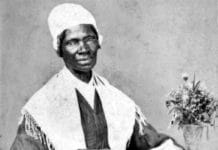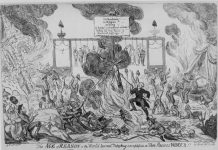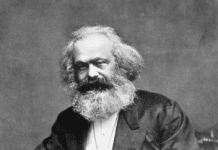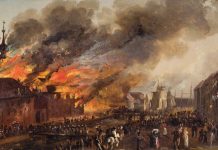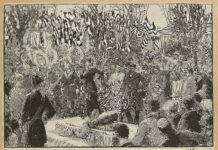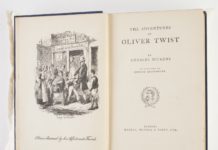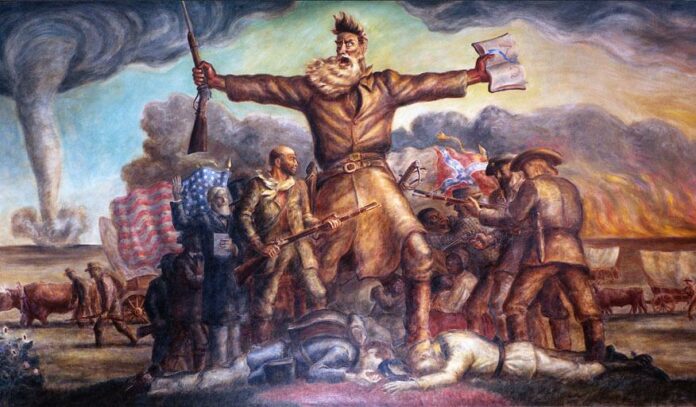
Personliste om den amerikanske abolitionist og slaverimodstander John Brown, som blev hængt 2. december 1859 for angrebet på et våbendepot ved Harpers Ferry, Virginia, 16. oktober 1859. Og om sangen “John Brown’s Body”.
(Tidsskriftcentret, december 2009)
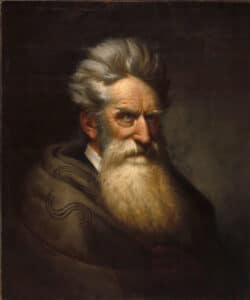
Leksikale og sites:
- John Brown Archive (Marxists Internet Archive). Med biografi, breve og taler.
- John Brown’s last speech (Zinn Education Project). One of the Voices of a People’s History of the United States recordings is of Brown’s last speech, read by Josh Brolin.
- John Brown (Spartacus Educational)
- John Brown (abolitionist) (Wikipedia.org). Længere artikel med en del link.
- John Brown’s raid on Harpers Ferry (Wikipedia.org). Længere artikel.
- Abolitionisme (Denstoredanske)
- Abolitionism (Wikipedia.org)
***
- John Brown’s Body (poem) (Wikipedia.org). Link to 1928 full text.
- John Brown’s Body [Song] (Wikipedia.org)
Paul Robeson – America’s low octave [shorter version] (YouTube, 2:44 min.)
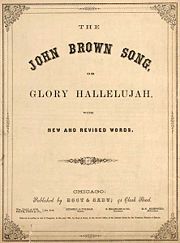
Artikler:
Dansk:
John Brown hænges for mord og forrædderi (Arbejderen.dk, 2. december 2008)
“Den 2. december 1859 bliver guerillaleder John Brown hængt i et fængsel i staten Virginia. Brown er dømt for mord og forræderi imod Virginias forfatning, men er før henrettelsen blevet folkehelt blandt de amerikanere, der kæmper for ophævelse af slaveriet.”
English:
“The John Brown way”: Grassroots frameworks, interlinked movements. Part 1 (Tempest, February 14, 2024)
“David Whitehouse tells a different story about John Brown, who led the 1859 raid against slavery in what was then Harper’s Ferry, Virginia.”
Part 2: Into battle (Ibid., March 8, 2024)
“In Part 2, we learn about the militant, cross-racial planning and action undertaken by Brown and his comrades in the context of regressive national laws and pro-slavery terror.”
John & Harriet. By Paul Bowers (Brutal South, May 11, 2022)
“The short friendship and long vision of John Brown and Harriet Tubman.”
Eugene Debs’s stirring, never-before-published eulogy to John Brown at Harpers Ferry. By Eugene Debs (Jacobin, January 27, 2022)
“In a previously unpublished eulogy to John Brown from 1908, Eugene Debs proclaimed Brown the ‘greatest liberator this country has known’ and declared that ‘the Socialist Party is carrying on the work begun by John Brown’. We publish it here in full.”
150 years since the execution of John Brown. By Fred Mazelis (World Socialist Web Site, 4 December 2009)
“One hundred and fifty years after his execution for the failed raid he led on the Federal arsenal at Harpers Ferry, the legacy of John Brown continues to generate controversy and disquiet.”
John Brown’s rebellion heralded the death of slavery. By Michael Bradley (Socialist Worker, Issue 2173, 17 October 2009)
“This week marks the 150th anniversary of a rebellion that helped end slavery in the United States. Michael Bradley looks back at a raid that many said was doomed to failure, and at John Brown, the man who led it.”
John Brown: 150 years after Harpers Ferry. By Terry Bisson (Monthly Review, Vol.61, No.5, October 2009)
“What some saw as his madness, and others as his martyrdom, is still discussed and debated, celebrated and vilified in scores of new articles and books every year.”
The road to Harper’s Ferry (SocialistWorker.org, March 27, 2009)
+ Insurrection at Harper’s Ferry (October 16, 2009). Excerpt from Truman Nelson’s book: The Old Man: John Brown at Harper’s Ferry (Haymarket Books, 2009)
“Truman Nelson narrates the events at Harper’s Ferry, with both a historian’s grasp of the issues that formed the backdrop to the raid, and a novelist’s eye for detail and character.”
Heroes of our movement: John Brown. By Katie Wood (Socialist Alternatives, Issue 125, February 2008)
“The raid on Harper’s Ferry was one of the catalysts for the Civil War, following the secession of the Southern states that answered in blood the question of what it would take to abolish slavery.”
John Brown, Abolitionist. By Jennifer Jopp (Against the Current, No.119, November-December 2005). Review of David S. Reynolds’ The Man Who Killed Slavery, Sparked the Civil War, and Seeded Civil Rights (Alfred A. Knopf, 2005)
“Reynolds mines extensively poems, songs, stories, letters, lectures – virtually all kinds of written material produced in the period – to recreate the culture of nineteenth-century America.”
John Brown’s raid on Harper’s Ferry. By Arthur Jordan (International Socialist Review, Vol.21, No.1, Winter 1960)
“John Brown was a revolutionary terrorist. But the adjective must be emphasized, for it is clear that at Harper’s Ferry he hoped to do more than strike fear into the slaveholders.”
John Brown – revolutionist. By Ernest Rice McKinney (Labor Action, Vol. 4, No.7, 27 May 1940; online at Marxists Internet Archive)
“John Brown hated slavery, and he believed that it could not be destroyed by peaceful means”
Homage to John Brown. By George Novack (New International, Vol.IV, No.1, January 1938)
“How did this ordinary farmer and business man, this pious patriarch become transformed into a border chieftain and a revolutionary terrorist?”
Se også på Socialistisk Bibliotek:
Tidslinjen: 12. april 1861, om den amerikanske borgerkrig
Emneboxen: Slaveri / Slavery
















